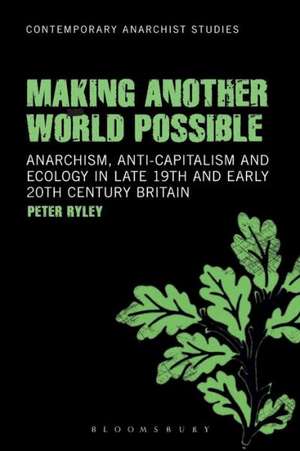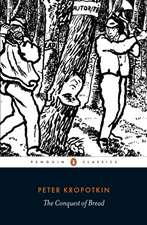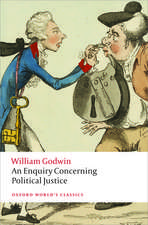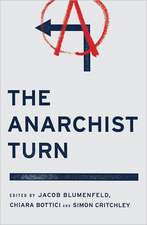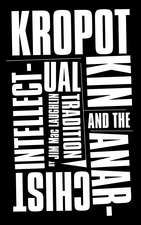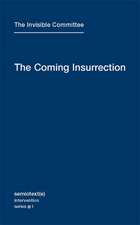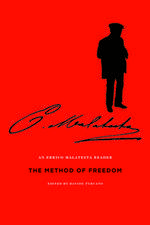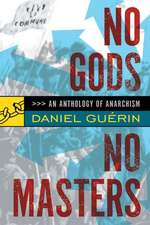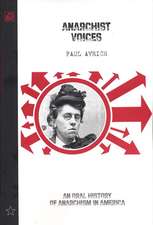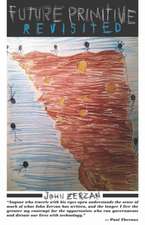Making Another World Possible: Anarchism, Anti-capitalism and Ecology in Late 19th and Early 20th Century Britain: Contemporary Anarchist Studies
Autor Dr. Peter Ryleyen Limba Engleză Paperback – 28 ian 2015
| Toate formatele și edițiile | Preț | Express |
|---|---|---|
| Paperback (1) | 257.41 lei 6-8 săpt. | |
| Bloomsbury Publishing – 28 ian 2015 | 257.41 lei 6-8 săpt. | |
| Hardback (1) | 715.73 lei 6-8 săpt. | |
| Bloomsbury Publishing – 11 sep 2013 | 715.73 lei 6-8 săpt. |
Din seria Contemporary Anarchist Studies
-
 Preț: 279.51 lei
Preț: 279.51 lei -
 Preț: 275.82 lei
Preț: 275.82 lei -
 Preț: 156.02 lei
Preț: 156.02 lei - 23%
 Preț: 236.37 lei
Preț: 236.37 lei - 26%
 Preț: 238.22 lei
Preț: 238.22 lei - 12%
 Preț: 239.59 lei
Preț: 239.59 lei - 23%
 Preț: 701.80 lei
Preț: 701.80 lei - 19%
 Preț: 705.10 lei
Preț: 705.10 lei -
 Preț: 280.18 lei
Preț: 280.18 lei - 13%
 Preț: 239.14 lei
Preț: 239.14 lei - 23%
 Preț: 190.96 lei
Preț: 190.96 lei -
 Preț: 309.20 lei
Preț: 309.20 lei - 23%
 Preț: 721.29 lei
Preț: 721.29 lei - 23%
 Preț: 721.29 lei
Preț: 721.29 lei - 23%
 Preț: 722.14 lei
Preț: 722.14 lei -
 Preț: 362.95 lei
Preț: 362.95 lei
Preț: 257.41 lei
Preț vechi: 331.14 lei
-22% Nou
Puncte Express: 386
Preț estimativ în valută:
49.26€ • 53.49$ • 41.38£
49.26€ • 53.49$ • 41.38£
Carte tipărită la comandă
Livrare economică 23 aprilie-07 mai
Preluare comenzi: 021 569.72.76
Specificații
ISBN-13: 9781501302831
ISBN-10: 1501302833
Pagini: 264
Ilustrații: 1 halftone illus
Dimensiuni: 152 x 229 x 14 mm
Greutate: 0.36 kg
Editura: Bloomsbury Publishing
Colecția Bloomsbury Academic
Seria Contemporary Anarchist Studies
Locul publicării:New York, United States
ISBN-10: 1501302833
Pagini: 264
Ilustrații: 1 halftone illus
Dimensiuni: 152 x 229 x 14 mm
Greutate: 0.36 kg
Editura: Bloomsbury Publishing
Colecția Bloomsbury Academic
Seria Contemporary Anarchist Studies
Locul publicării:New York, United States
Caracteristici
Looks at the possibility of an alternative political economy derived from anarchist and ecological sources
Notă biografică
Peter Ryley worked for more than thirty years in adult and higher education before taking early retirement from the University of Hull's Centre for Lifelong Learning. After a spell teaching history part-time at Manchester Metropolitan University, he is now fully retired from lecturing and is an independent researcher and writer.
Cuprins
Chapter 1 Property and Progress: The Emergence of Anarchist Political Economy Chapter 2 Kropotkin and the Rise of Anarchist Communism Chapter 3 The English Individualists Chapter 4 Individualist Anarchism in Late Victorian Britain Chapter 5 Anarchist Communism in the Era of Outrage Chapter 6 The Rise of Ecological Anarchism: Elisée Reclus and Patrick GeddesChapter 7 Conclusion
Recenzii
An ambitious, lively and detailed examination of a tradition of political thinking that was an under-appreciated presence in British intellectual life. Its major contribution is the recovery of individualist thinking as an aspect of this history
Peter Ryley's book recovers the history of a badly neglected, valuable tradition of anarchist thinking that is richly inventive, refreshingly irreverent and fiercely defiant. His carefully documented defence is affectionate yet critical; and breathing life into an extraordinary set of activists, Ryley not only shows why historical engagement is relevant to contemporary politics he also challenges some radical orthodoxies in the process.
Peter Ryley's Making Another World Possible is a well-researched, superbly written guide to forgotten alternatives to the capitalism of late Victorian and Edwardian Britain. With humor and some empathy (but never veering into naive hagiography), Ryley takes seriously the contributions of a set of thinkers who have been treated with condescension by orthodox historians with eyes on the purveyors of establishment views or more well-known alternatives. A significant contribution to the history of political ideas, this is a book worth spending time with.
Quite apart from the durable purpose this book will surely serve for its long-overdue reconnaissance of some of the most neglected terrain in Victorian-era British radical thought, Peter Ryley's Making Another World Possible arrives as a work of immediately urgent relevance in the current moment of tear gas, financial implosion, austerity shock, and the preeminent ecological challenge of global climate change.In his resolve to "reassert the importance of history against the arrogance of the present," Ryley succeeds splendidly in showing that we have been here before, not least in the work of imagining human progress against the contradictions of economic growth and the limits necessarily imposed by environmental sustainability. No mere polemic, Making Another World Possible is history of the most serious kind, but it's told in the most lively and refreshing sort of way. Ryley situates the young hipsters of the Occupy Movement, the direct-action cadres of the Zapatistas and the Indignados and the anti-globalization protesters of the 1990s within the same conversation as the sophisticated politicians of the Green Party and even free-market utopians. This is a conversation with perhaps its deepest roots in the raucous and cosmopolitan radical milieu of 19th century Britain, perhaps most noticeably in the early ecological anarchism of Patrick Geddes and Elisée Reclus. To that milieu, Ryley helpfully reclaims the overlooked Victorian individualists Herbert Spencer, Wordsworth Donisthorpe, Joseph Hiam Levy and others as upstanding contributors to schools of thought most closely associated with the likes of Pierre-Joseph Proudhon, Mikhail Bakunin and Peter Kropotkin. In the contemporary rediscovery of a broadly-defined anarchism as a "doctrine of hope," with all its idiosyncrasy and utopianism and its individualist, communist, pragmatic, libertarian, and even Christian variants and foundations, Making Another World Possible serves as both an indispensable resource and a generous and engaging companion.
Contemporary Anarchist Studies positions anarchism squarely in the mainstream of political research and methodology. Rather than treating it as an "anti-politics" approach to political ideas and ideologies, it integrates anarchism into many of the central concerns of political theory, casting a fresh and critical look on the discipline as a whole. Employing perspectives from philosophy, ideology and history, this ambitious and important series offers rich pickings to scholars and students alike.
At a time of the accelerated destruction of the environment and the increasing power of states and corporations to control the lives of people throughout the world, this anarchist series of challenging and thoughtful books could not be more timely and relevant. They not only offer an incisive critique of authoritarian things as they are but show vividly the libertarian alternative. The profoundest radical energy is now coming from anarchist theory and practice. The series should therefore be widely welcomed and discussed if we are to emerge from the present natural and political impasse.
This series makes a real contribution by bringing a much-neglected political tradition to the attention of scholars and activists. Anarchism has a rich past and an open future. The series editors have brought together a group of thinkers who explore both in a provocative and timely fashion.
Contemporary Anarchist Studies is a most welcome, and timely, addition to bibliography on anarchism, political philosophy, and social movements. Anarchist theory, at its best, begins with issues confronting real people, and is written in language they can understand. The volumes in this series do just that, avoiding both obfuscation and condescension. I eagerly await the next installments!
Peter Ryley's book recovers the history of a badly neglected, valuable tradition of anarchist thinking that is richly inventive, refreshingly irreverent and fiercely defiant. His carefully documented defence is affectionate yet critical; and breathing life into an extraordinary set of activists, Ryley not only shows why historical engagement is relevant to contemporary politics he also challenges some radical orthodoxies in the process.
Peter Ryley's Making Another World Possible is a well-researched, superbly written guide to forgotten alternatives to the capitalism of late Victorian and Edwardian Britain. With humor and some empathy (but never veering into naive hagiography), Ryley takes seriously the contributions of a set of thinkers who have been treated with condescension by orthodox historians with eyes on the purveyors of establishment views or more well-known alternatives. A significant contribution to the history of political ideas, this is a book worth spending time with.
Quite apart from the durable purpose this book will surely serve for its long-overdue reconnaissance of some of the most neglected terrain in Victorian-era British radical thought, Peter Ryley's Making Another World Possible arrives as a work of immediately urgent relevance in the current moment of tear gas, financial implosion, austerity shock, and the preeminent ecological challenge of global climate change.In his resolve to "reassert the importance of history against the arrogance of the present," Ryley succeeds splendidly in showing that we have been here before, not least in the work of imagining human progress against the contradictions of economic growth and the limits necessarily imposed by environmental sustainability. No mere polemic, Making Another World Possible is history of the most serious kind, but it's told in the most lively and refreshing sort of way. Ryley situates the young hipsters of the Occupy Movement, the direct-action cadres of the Zapatistas and the Indignados and the anti-globalization protesters of the 1990s within the same conversation as the sophisticated politicians of the Green Party and even free-market utopians. This is a conversation with perhaps its deepest roots in the raucous and cosmopolitan radical milieu of 19th century Britain, perhaps most noticeably in the early ecological anarchism of Patrick Geddes and Elisée Reclus. To that milieu, Ryley helpfully reclaims the overlooked Victorian individualists Herbert Spencer, Wordsworth Donisthorpe, Joseph Hiam Levy and others as upstanding contributors to schools of thought most closely associated with the likes of Pierre-Joseph Proudhon, Mikhail Bakunin and Peter Kropotkin. In the contemporary rediscovery of a broadly-defined anarchism as a "doctrine of hope," with all its idiosyncrasy and utopianism and its individualist, communist, pragmatic, libertarian, and even Christian variants and foundations, Making Another World Possible serves as both an indispensable resource and a generous and engaging companion.
Contemporary Anarchist Studies positions anarchism squarely in the mainstream of political research and methodology. Rather than treating it as an "anti-politics" approach to political ideas and ideologies, it integrates anarchism into many of the central concerns of political theory, casting a fresh and critical look on the discipline as a whole. Employing perspectives from philosophy, ideology and history, this ambitious and important series offers rich pickings to scholars and students alike.
At a time of the accelerated destruction of the environment and the increasing power of states and corporations to control the lives of people throughout the world, this anarchist series of challenging and thoughtful books could not be more timely and relevant. They not only offer an incisive critique of authoritarian things as they are but show vividly the libertarian alternative. The profoundest radical energy is now coming from anarchist theory and practice. The series should therefore be widely welcomed and discussed if we are to emerge from the present natural and political impasse.
This series makes a real contribution by bringing a much-neglected political tradition to the attention of scholars and activists. Anarchism has a rich past and an open future. The series editors have brought together a group of thinkers who explore both in a provocative and timely fashion.
Contemporary Anarchist Studies is a most welcome, and timely, addition to bibliography on anarchism, political philosophy, and social movements. Anarchist theory, at its best, begins with issues confronting real people, and is written in language they can understand. The volumes in this series do just that, avoiding both obfuscation and condescension. I eagerly await the next installments!
